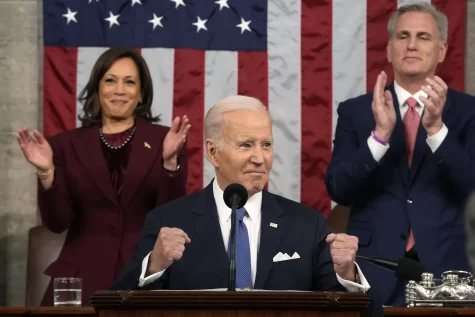Med school declares dean, vision
By Masudur Rahman
and Rory McCarty
Senior Reporters
After 18 months of planning, the board of trustees officially approved the Oakland University administration’s proposal for an OU medical school at a BOT special formal session held on Thursday, July 31. All trustees enthusiastically embraced the proposal and the vote was unanimous.
The medical school will be a partnership between OU and Beaumont Hospitals and is to be named Oakland University William Beaumont School of Medicine. OUWBSM will be a private school, and its revenue will come from donations and tuitions of the medical school students, as well as from commercialization of intellectual property, partner contributions and extramural research.
The trustees also approved the appointment of Dr. Robert Folberg as the dean of the medical school. Folberg has experience as a medical doctor specializing in pathology, as a biomedical researcher, as a hospital administrator and as a professor.
In addition to serving as the founding dean of OUWBSM, Folberg will also serve as professor of biomedical sciences, pathology and ophthalmology with tenure, as well as chief academic officer of Beaumont Hospitals.
All OU and Beaumont officials present, including Beaumont Hospital’s Executive Vice President and Chief Medical Officer Ananias Diokno, highly approved of Folberg’s appointment as the dean, saying that Folberg comes recommended in the three important parts in medicine: practicing, research and education.
“That’s what we call a triple threat — a pitcher, hitter and fielder,” he said.
OU President Gary Russi expressed his support for the upcoming medical school and said that it will be beneficial for the university as a whole. “Any time you increase the stature and recognition of the school, it’s going to attract more students, more donations and more grants.”
Russi said that $25 million has been raised in gift commitments on behalf of the medical school already, and that OU will try to raise $75 million more for a total of $100 million before the school opens. Russi plans to have the school open in 2010 with a starting class of 50 students and to have the first class graduate in 2014.
Beaumont Hospitals president and CEO Kenneth Matzick said that Russi and he are “in full accord in the mission and the vision of the medical school.”
The vision of the school is to “train physicians to practice 21st century medicine with an emphasis on lifelong learning, technology research, preventative and pre-symptomatic medicine, treatment and management of chronic disease, and teamwork.”
Russi also said that the school will have an emphasis on preventative medicine, pre-symptomatic treatment and alternative medicine.
At a press conference held after the board of trustees session, Folberg said that his plan for the medical school is to let the students discover what they were interested in, adding that the school’s education curriculum will not specialize in just one thing.
Folberg also said that he wants to “surround students with patients” so that the students will learn how to treat and behave around patients better. “Because in the end, it all goes back to the patients,” he said.
OU and Beaumont Hospitals said that 90 percent of the school’s infrastructure already exists.
Instruction and research of the basic sciences is to be held on OU’s Rochester campus, while clinical instruction and advanced research will be held in Beaumont Hospitals.
Many officials in support of the planned school said that it will make advances in research, help with the predicted future shortage of doctors in Michigan and boost the economy of Oakland County. A 2007 survey by the Michigan Department of Community Health showed that within the decade as much as 41 percent of current Michigan physicians will retire.
“This new medical school will solve the predicted shortage of physicians in Michigan and attract renowned educators and researchers to the region,” Matzick said at the press conference.
Oakland County Executive L. Brooks Patterson said that he foresees Oakland County’s economy benefiting from the new medical school. “I’m not talking millions, I’m talking hundreds of millions,” he said.
Oakland University estimated that the regional economic boost from the medical school might be as high as $1 billion.
At a banquet after the press conference, several OU students said that they were glad that the medical school is coming to OU.
“The thing is, this medical school is going to benefit not only the students going to this med school, but anyone who goes to OU,” said Samir Hanna, student liaison to the board of trustees. “Whether you’re applying for a grad school or for a job, the higher prestige and recognition that comes along with having an undergraduate degree from a school with an accredited medical school definitely helps.”
“[OUWBSM will] increase the value of every OU student’s degree,” Hanna said.
“It’s going to be difficult to say you’re going to a lousy school when there’s an accredited medical school,” said sophomore biology major Nick Collins.
Folberg said many challenges still lie ahead, and that choosing the other high officials, professors and the curriculum will be the next step. “I thank you for all the help that you’ll give me,” he said to his coworkers.
Another important objective of Folberg and the planners of OUWBSM is to get the medical school accredited by Liaison Committee on Medical Education, a step that is necessary in order to have its graduates licensed to practice medicine, according to the lcme.org.
According to the OUWBSM website, www.oakland.edu/medicine, OUWBSM hopes to get preliminary accreditation by May or June 2009.
The trustees also unanimously approved extending the end of Russi’s contract as OU president from 2012 to 2014. Trustee Henry Baskin said that Russi was crucial in planning the medical school and “ought to at least see the first class graduate through.”











